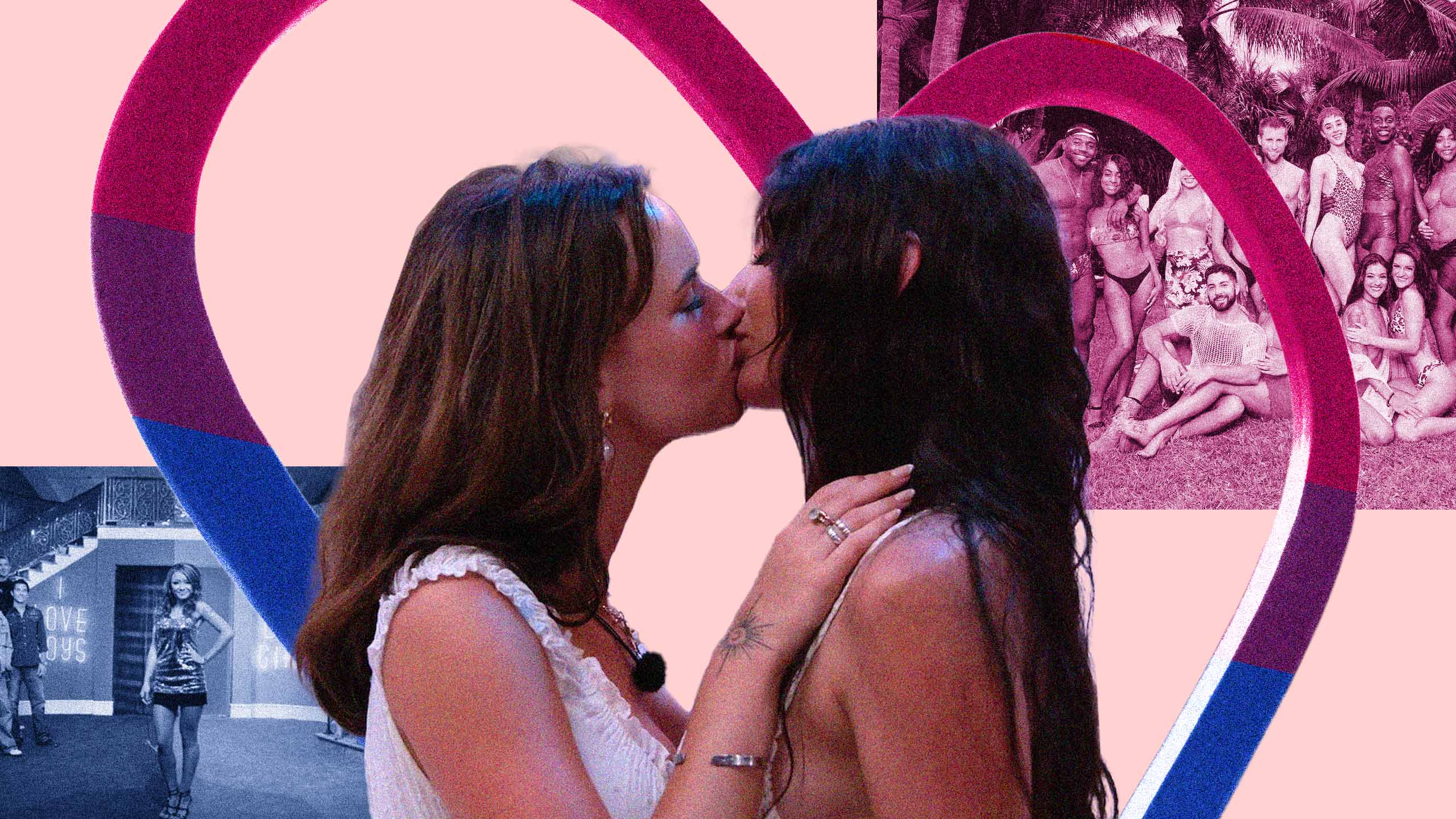It’s 2008. Katy Perry’s “I Kissed a Girl” is number one on the Billboard Hot 100, Grey’s Anatomy boasts a bisexual surgeon and I’m glued to MTV, watching the finale of my favourite reality dating show. I’m eight years old, and for the first time in my life, I watch a woman profess her love to another woman on TV.
The second season of A Shot at Love with Tila Tequila ended with the titular MySpace model choosing to couple up with fellow bisexual Kristy Morgan. Not even realizing I was bi at the time, even I felt a flicker of recognition.
But the ending wasn’t exactly a happily ever after. Kristy rejected Tila, and Tila didn’t return for a third attempt at reality TV romance. She actually went on to become a prominent alt-right figure and claimed she faked being bisexual for the show because Hollywood forces people to “defile themselves” with “homosexual rituals.” Not exactly the bi-con we deserve.
The show itself wasn’t worth celebrating either. Its first season operated on the premise that Tila, our bisexual protagonist, had to “pick a side” between a bunch of dude-bro straight guys and mostly femme lesbians. Unsurprisingly, A Shot at Love’s massive popularity wasn’t because it presented some progressive spin on The Bachelor formula that broke down the socially defined barriers of gender and sexuality. It was because it catered to a straight male audience who wanted to watch hot chicks make out on TV.
A Shot at Love is remembered as a piece of problematic trash TV spectacle that catered to a male gaze and rejected the bisexual logic of its own premise. But it also did something virtually unheard of at the time: it put queer romance on reality TV.
My affinity for reality TV persisted through a decade of The Bachelor franchise to the more modern heterosexual hallmarks of the genre like Love Is Blind and Too Hot to Handle. So when Netflix dropped Perfect Match—a crossover involving singles from a bunch of different Netflix reality shows, I was eager to watch some of my favourite (and least favourite) characters assemble for what was sure to be fantastic, high-brow television.
Perfect Match exploded into a pop culture phenomenon, logging over 100 million hours of view-time, according to Netflix. While most of its fans have been arguing over the breakup drama between the now-split winning couple Georgia Hassarati and Dom Gabriel, I can’t stop thinking about how the show’s fumbled bisexual representation demonstrates just how badly we need to queer the entire reality TV genre.
In Perfect Match, contestants couple up in order to keep their place in the Panama City villa, with new singles being brought in each week to mix up existing couples and cause drama. Like its predecessors, Perfect Match’s premise relies on a binary heterosexuality to maintain a balanced number of men and women on the show.
This balance was challenged when two bisexual contestants, Francesca Farago and Abbey Humphreys, coupled up in Episode 8. The show responded by throwing the rules out the window and opening up an extra room so the two women could stay together. Their brief time on-screen as a couple resulted in genuinely touching moments, like the two opening up about their experiences coming out, and inspiring housemate Kariselle Snow to have a conversation with her partner, Joey Sasso, about her own bisexuality.
If you’re keeping track, that’s three whole bisexuals on one Netflix dating show. Cancel the next Pride parade, everyone—we did it.
But here’s where the problems start. Joey’s response to Kariselle vulnerably expressing fears about marrying a man invalidating her bisexuality was “bring home a woman any time you want.” At a later pool party, Francesca and Kariselle make out, and when Abbey gets upset, Francesca says she’s overreacting. Joey ogles as the two women kiss and we hear his slimy commentary, “God, that’s beautiful … I support this 150 percent. I got nothing to complain about.” He tells Francesca she is “always welcome to stay the night.” Another man in the house says that Francesca being bisexual is “hot.”
This series of events undermines the representation that Perfect Match is clearly trying to pride itself in. It simultaneously fetishizes and downplays relationships between women, presenting them as a manifested male fantasy, unthreatening to the dominant heterosexual order.
While the majority of Netflix’s dating show catalogue consists of mixed-cast formulas ripe for diverse sexualities and gender identities, they have failed to deliver time and time again. Instead, when I open the app, my Top Picks section is clogged with a new cast of uniformly straight and cis wannabe influencers (not to mention young, thin, able-bodied and overwhelmingly white).
MTV’s Are You The One? offered a glimmer of potential with its 2018 season’s fully queer cast (also starring Kariselle from Perfect Match … how is nobody talking about that?), which included trans and non-binary contestants. The 2021 season of The Bachelorette Australia’s bisexual lead Brooke Blurton—a first in the history of the franchise—was another celebrated sign of progress.
That’s all great, but are queer and trans people just supposed to wait around for headline-making representation milestones once every three years?
Other shows like Bachelor in Paradise have featured bisexual couples, storylines and characters, but, like in Perfect Match, they’re treated as special cases. The one-off queering of these fundamentally heteronormative shows isn’t enough. It turns queer people and our love stories into event television—fun departures from the norm that viewers can be assured will be inevitably returned to.
As we look to the future of reality dating shows, it’s clear that sprinkling queer people into existing heterosexual frameworks just won’t cut it. Producers need to stop relying on these binary structures that not only complicate any potential queer storylines, but outright prevent contestants outside the gender binary from participating.
Here’s my pitch: why not abandon the entire notion that these shows have to maintain a 50/50 split of straight men and women? Perfect Match’s first season already showed that its existing rules are completely arbitrary. The show would still work with a mix of straight, queer, trans and non-binary singles. Contestants could just pursue whoever they share a mutual interest with, regardless of gender.
I know my vision of queer utopia hinges on the show providing a safe and inclusive space for marginalized contestants. Based on how Black women were largely relegated to the sidelines in Perfect Match, I acknowledge that this is easier said than done. But Netflix can’t just keep patting themselves on the back for acknowledging that queer and trans people exist without actually making shows that allow them to authentically participate.
After churning out a combined eight seasons of their painfully heterosexual flagship series Love Is Blind and Too Hot to Handle, Netflix may finally be looking to freshen up its formula. The long-promised upcoming second season of The Ultimatum, a show that tests couples who disagree over taking the leap into marriage, reportedly boasts an entirely queer cast—although it is yet to be given an official release date.
The next generation of reality TV fanatics—the very people Netflix is trying to cater to with its near-constant output of content—is super gay. According to 2022 research by Gallup, nearly 20 percent of Gen Z over 18 in the U.S. are LGBTQ2S+, and that number is only expected to grow. If streamers want young people to tune in to their programming, accurately representing us would be one way to do it. Otherwise, we’ll keep getting our queer-dating drama fix from TikTok. I’m not ready to give up on my favourite trashy pastime. Charting the path from A Shot at Love to Perfect Match, we are making progress. But mere visibility isn’t enough—dating shows need to present queer love as viable, and challenge the binary assumptions of gender and sexuality that the genre is built on.


 Why you can trust Xtra
Why you can trust Xtra


